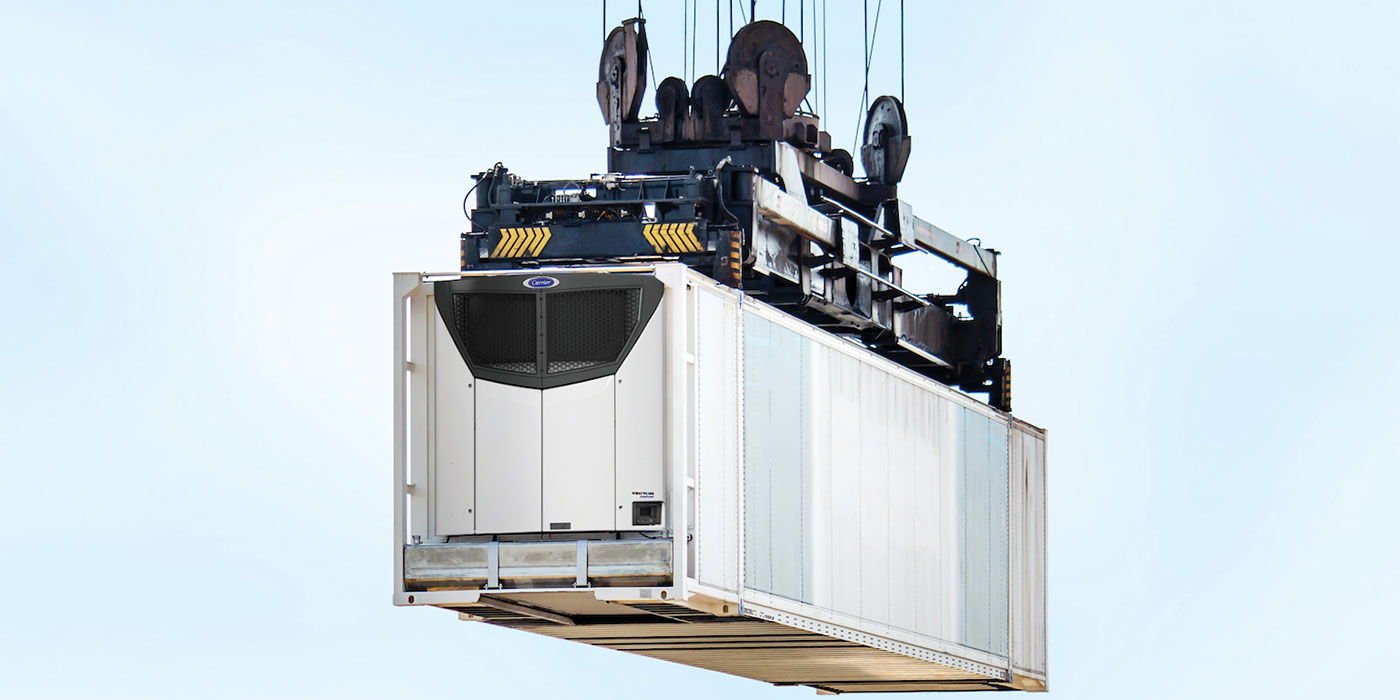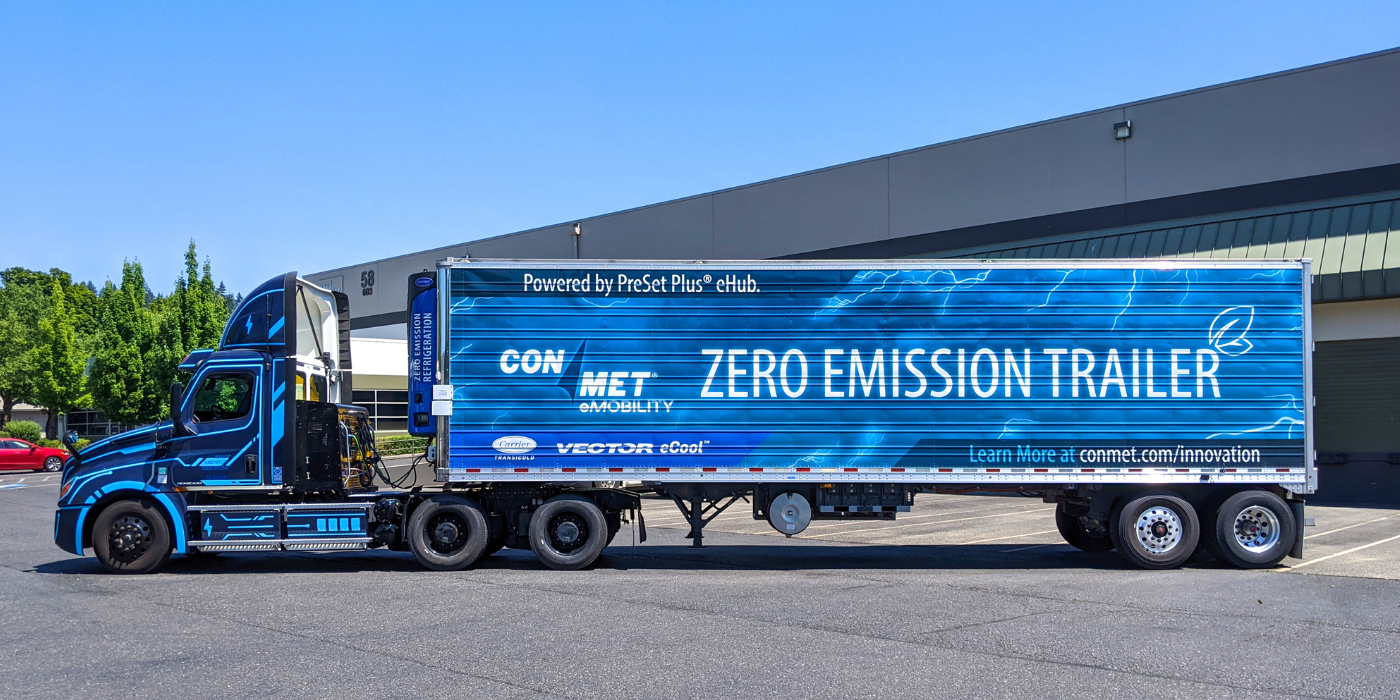le reducing noise and emissions, and saving fuel for the road? A no-brainer, right?
According to Alan Bates, vice president of marketing for Shorepower Technologies, that no-brainer is simply called 460-volt power, and reefer fleets are beginning to see the benefits. “The infrastructure is slowly making its way across the country, as we put in eTRU connections, along with 120-volt power for cab conveniences,” he says. “But what will transform the concept to reality is reefer fleets stepping forward asking for the power, then detailing where they want it. At $2 an hour for electric power, a refrigerated trailer could save up to approximately 50% on energy costs vs. diesel, not to mention maintenance savings. It is a very straight-forward technology and benefit.”
Many fleets have already “electrified” their own terminals, and seek out truckstops that offer power while on the road. “It makes total sense to us,” says Charla Whalen-Mueller, marketing director for Witte Bros, a provider of nationwide temp-controlled truckload service, custom refrigerated LTL distribution programs and full-service cold storage.
“We have 225 reefers with Carrier Vector diesel/electric hybrids and another 20 on order,” she says. “Once we have those, our entire fleet will be hybrids and able to run on electric power once we’re parked.”
Based in Troy, Mo., Witte Bros. has made extensive use of anti-idling technologies, starting at its own facilities. “At our home base, we use 460-volt, 3-phase electric plug-ins for our reefer units,” says Whalen-Mueller. “Plug-in power means that even when drivers go home during the week and on the weekends, there’s no idling of trucks or trailers to keep perishable loads cool while parked at the company’s yard.”
On the road at truck stops, though, it’s a different story. Witte Bros. uses diesel-fired APUs to reduce idling for in-cab comforts and conveniences. It plans to invest in APUs with shore power capability on upcoming truck orders, to take advantage of AC-power. But operating the reefer engine is still necessary most of the time to keep refrigerated loads in trailers cool.
But, that’s starting to change. “We’ve been encouraged to see some truckstops putting in power pedestals, and that includes 460-volt power for our eTRUs reefer plug-ins,” Whalen-Muller says. “We can’t yell loud enough that we want power at truckstops for not only our cab comforts, but for our reefer units. It makes so much economical and environmental sense and we hope that our voice and others, who run hybrid reefers, will help make that call to action a reality.”
Whalen-Muller did her own calculation on the potential impact. “With 170 of our power units going out weekly, we potentially could plug in at truckstops for an average of 31.5 hours per week, per unit. Multiplied by our fleet number, that’s 1,071 gallons of fuel we could save per day over idling the reefer at a truckstop, or 5,355 gallons per five day work week. That’s around $20,000 a week we could save in fuel costs.”
Viking Ship, of Nebraska City, Neb., another Carrier customer that has seven Vector 6500 single-temperature hybrids installed, with plans to be 100% hybrid soon, is another carrier sold on plugging in. “We’re relatively small with just 15 units, but we’re successful and run coast-to-coast,” says Roger Claussen, president of Viking Ship. “We normally load up on Friday night with meat products and bring the trailers back to our yard where we plug in. The next morning, our drivers will leave for Florida and California. But, what we’re lacking is places to plug in along our route. Not only would this save us fuel, but it would extend maintenance and repairs on the reefers units.”
David Kiefer, director of marketing and product management for Carrier Transicold, says he has heard stories like this from many of his customers. “It’s because the use of electric standby significantly reduces operating costs – usually 40% to 70% compared to operating on diesel, depending on the cost of fuel and electricity,” says Kiefer. “Standby operation brings additional benefits, eliminating emissions and noise from the refrigeration unit engine, while also conserving fuel for the highway. Depending on the fleet and its distribution network, the time a unit is parked for loading and unloading can account for a large portion of the eTRU runtime, so the savings can be significant.”
According to Kiefer, Carrier has seen the Vector’s popularity rapidly increase. “Initial customer demand was piqued by benefits of unit efficiencies, reduced maintenance requirements and quieter operation offered by electric refrigeration systems,” Kiefer says. “The built-in electric standby capability has become a more important feature as fuel prices have risen and customers have recognized the savings potential. In some of the more developed countries in Europe, where hybrid systems have been available longer and fuel prices are significantly higher, more than 70% of TRUs sold today have electric standby.”
Kiefer says he’s a true believer that truckstop electrficiation, and offering plug-ins for TRUs will be good for all in the industry. “Everyone wins,” he says. “We anticipate continued growth in the market as people try out hybrid refrigeration units and experience the benefits and performance they provide. As plug-ins become more widely available on the road, it will only drive the adoption towards hybrids even faster.”
According to Bates, government is helping fleets put in power at their own terminals – to the tune of up to a $30,000 in tax credits. “It’s helping move fleets from bleeding edge to cutting edge by absorbing some costs,” he says. “Now the next step is power at truckstops, and that will take time. We do have the I-5 corridor well connected with seven truckstops now offering eTRU plug-ins and at strategic stops throughout the country nearly 30 total. There is more to come. We just need flagship, large reefer fleets to work with us to zero in on what’s next. Some day, I firmly believe that many reefer fleets will be able to conveniently enjoy the cold silence of plug-in power at truckstops most everywhere they travel.”



